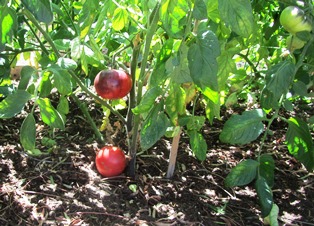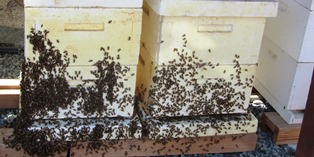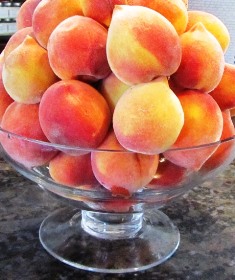Puzzling through a Cozy, Weeping at a Memoir, and Forgetting the Peach Pie
I couldn’t breathe in yesterday’s heat. But with so much work to be done around the farmette, I soldiered on, staking heirloom blue tomatoes. I hadn’t finished canning my organic apricots and now the plums and peaches were ready. I felt overwhelmed and longing for cool spot to sip tea, rest, and read.
We had already removed the apricots from our “torture tree” since we’ve been unable to surmount its many problems after planting it five years ago. Carlos wasted little time chain-sawing it down. I deadheaded the roses, while he dug out the stump.
Then with a clear view to our hives, we quickly realized that the we needed to suit up and install extenders or the bees would swarm. Even as we felt the urgency, we realized there were also dozens of other chores screaming for our attention.
I told myself that breezes would soon blow inland from the Carquinez Strait, a channel of the San Francisco Bay where the San Joaquin and the Sacramento Rivers flow to the ocean, but by mid-afternoon, nary a leaf moved on the apricot, plum, and pomegranate trees. By four o’clock when the wind finally did kick in–the air wasn’t cool as it usually was. The winds blew strong and stifling hot and threatened to suffocate anyone still working outside.
Abandoning the outside chores, I retreated indoors and turned on the air conditioner. Seeing the lug of apricots and crock of peaches resting on the kitchen counter, I groaned. The jam had to be made, but I couldn’t face stirring boiling fruit on a hot stove.
Deciding to use up some of the fruit for a simple after-dinner dessert, I flipped through the pages of a few cookbooks. Maybe a cobbler would do or a peach pie. I really didn’t need a recipe for those, but in Country Cooking by Dori Sanders, I found an intriguing raisin-cinnamon crust that sounded tasty. I bet it would go with peaches but I probably could have baked it on the patio floor.
With a glass of sweet tea and an armload of paperbacks and hardcovers, I curled up on the couch and finished reading Murder is Binding, Lorna Barrett’s debut book in her cozy Booktown Mystery series. I love this author and her writing, but soon figured out who done it. Still, I read to the end; you never know when a clever twist might show up.
Next, I read the last few pages of A Tuscan Childhood by Kinta Beevor. At bedtime, I’d been savoring the chapters of that book like pieces of rich, dark chocolate. Beevor’s evocative descriptions of her bohemian childhood in Tuscany captured my imagination, drawing me in so completely I could almost smell the wild thyme, pine needles, and rocky Tuscan terrain in the searing, summer heat. Like Frances Mayes (Under the Tuscan Sun), who wrote a quote for the cover, I felt sad when Beevor’s lovely memoir ended.
Returning to the stack, I selected another memoir, The Orchard, by Theresa Weir. I’d bought the book on impulse during a trip to the farmers’ market at Todos Santos Plaza, our downtown green space surrounded by bars and banks and, of course, a second-hand bookstore. Drastically marked down, the book had been summarily deposited on a set of moveable shelves, and rolled outside the storefront for a quick sale.
The artist and writer in me understood immediately why I had picked it up and purchased it: the cover art pictured a young couple in a loving embrace, standing in lush green grass surrounded by apple trees. But there was something in that image that evoked sadness, like a bittersweet dream of a time past, viewed through a long lens.
As the descendant of five generations of farmers, I suspected Weir’s book would resonate with my own experiences of farm life in America’s heartland with bone-chilling winters of snow and ice and sweltering summers when you prayed for rain. What I didn’t expect was exquisite writing and the juxtaposition of love against the deadly realities of widespread pesticide use on the farms that ushered me into her story and swept me along. I finished that book in one sitting and will long be haunted by it.
I felt guilty for having only paid pennies for Weir’s book. A pittance for a tale that evolved out of all she had lived through. Less than the price of bus fare to journey with her as she pieced together scenes from her life in the Heartland. In every page, I was with her as she struggled, never abandoning her dreams. She learned as I had how to tuck them away while you dealt with the realities of a hard life with heart-breaking lows and highs that reached euphoria. But there were scenes she left out, only hinting at experiences she said she would “never talk about.” The truth is, I wept after putting down her book.
When a reader identifies so closely with a character in a story (and this was Weir’s personal narrative of her life), he or she rides the emotional ups and downs with that character. Good writers understand how to tug at their readers’ emotions and milk the drama. Theresa Weir had skillfully threaded a leitmotif of darkness and light, joy and sorrow, pain and healing through her story, but never once did I feel manipulated. Every sentence of The Orchard rang true.
I couldn’t read anymore after putting that book down. As I made dinner, I thought of how many scenes in her life resonated with mine. Even the widespread pesticide use on farms and the stubbornness of farmers to change.
I thought about Rachel Carson’s famous book, Silent Spring, that sounded the wake-up call to farmers everywhere about the dangers of chemicals in fertilizers, pesticides, and herbicides. So many small farms have been overtaken by agribusinesses these days and still the chemicals are used. I decided to forgo making the peach pie.
With the heat of the day gone, I opened the windows and stretched out between freshly washed sheets. I listened to the rustle of oak and eucalyptus leaves. To crickets and the unseen critters that make noises in the night. I listened to the soft voices of my Lebanese neighbors chatting in their orchard with relatives.
As dreams beckoned, I could almost smell the fresh lilacs that Theresa Weir had written about in her memoir. Their cloying scent had filled her grandmother’s kitchen just as they had filled my grandmother’s, my mother’s, and mine. I wondered if the lilacs would ever disappear or if the world would one day wake up to find the honeybees gone, the fruit trees without fruit, and the berries and other sweet produce in our gardens and orchards reduced to a memory.
 Facebook
Facebook Goodreads
Goodreads LinkedIn
LinkedIn Meera Lester
Meera Lester Twitter
Twitter






